An Analysis of Entrepreneurship, SMEs and Economic Development
VerifiedAdded on 2021/02/21
|11
|2601
|20
Report
AI Summary
This report provides a comprehensive overview of entrepreneurship and small business management. It begins with an introduction to entrepreneurs and entrepreneurial ventures, exploring their significance in economic development. The report then delves into different types of entrepreneurial ventures, including small businesses, large companies, and social enterprises, highlighting their characteristics and purposes. It also examines various typologies of entrepreneurship such as lifestyle enterprises and growth firms, and their interrelation. The report further analyzes the differences and similarities between entrepreneurial ventures. A significant portion of the report focuses on the role of SMEs in economic development, discussing their impact at local, regional, and national levels. It also examines the importance of startups and small businesses in job creation, improving living standards, and fostering economic growth, particularly in the UK. The report concludes with a summary of key findings and a list of references.

Entrepreneurship
and
Small Business
Management
and
Small Business
Management
Paraphrase This Document
Need a fresh take? Get an instant paraphrase of this document with our AI Paraphraser
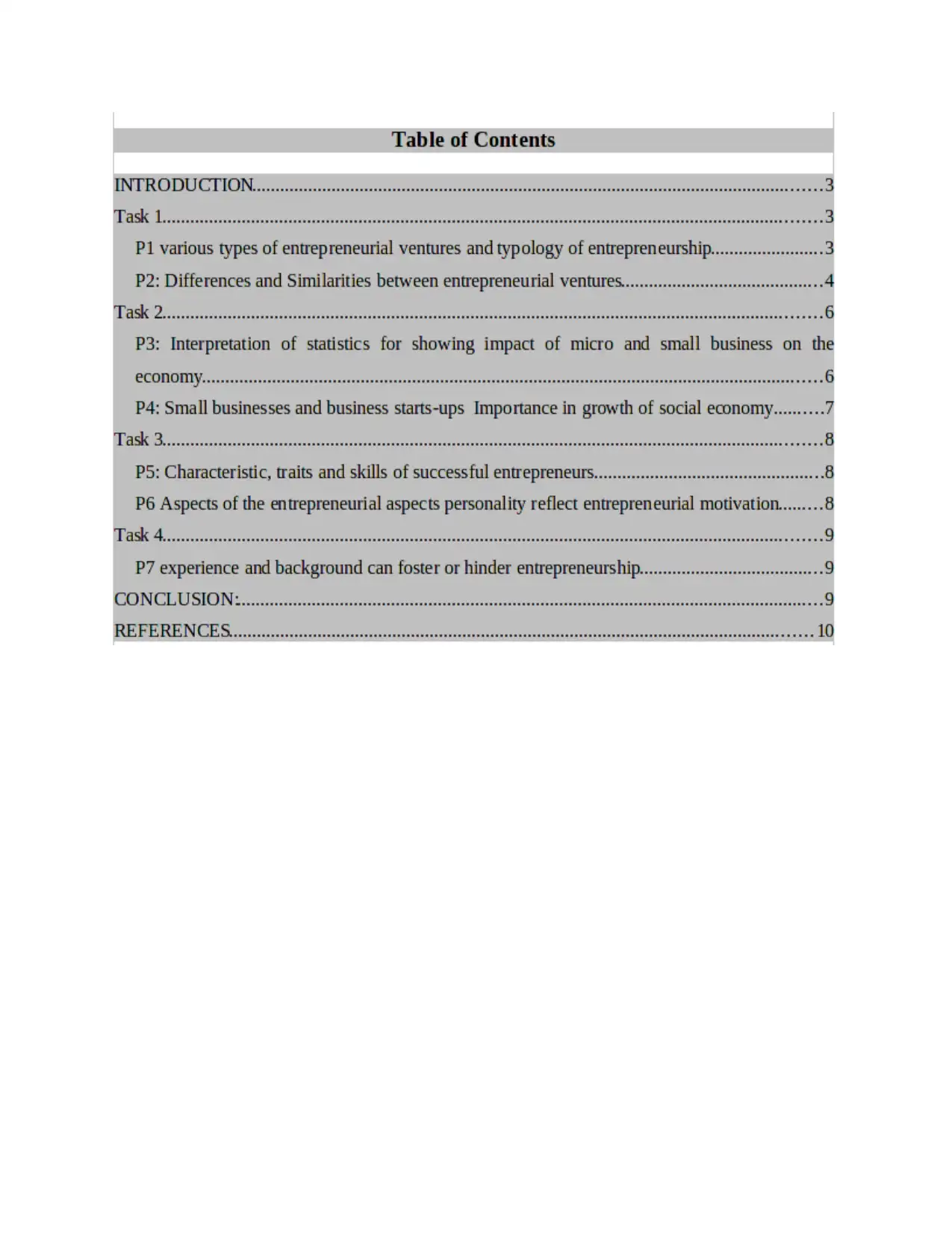
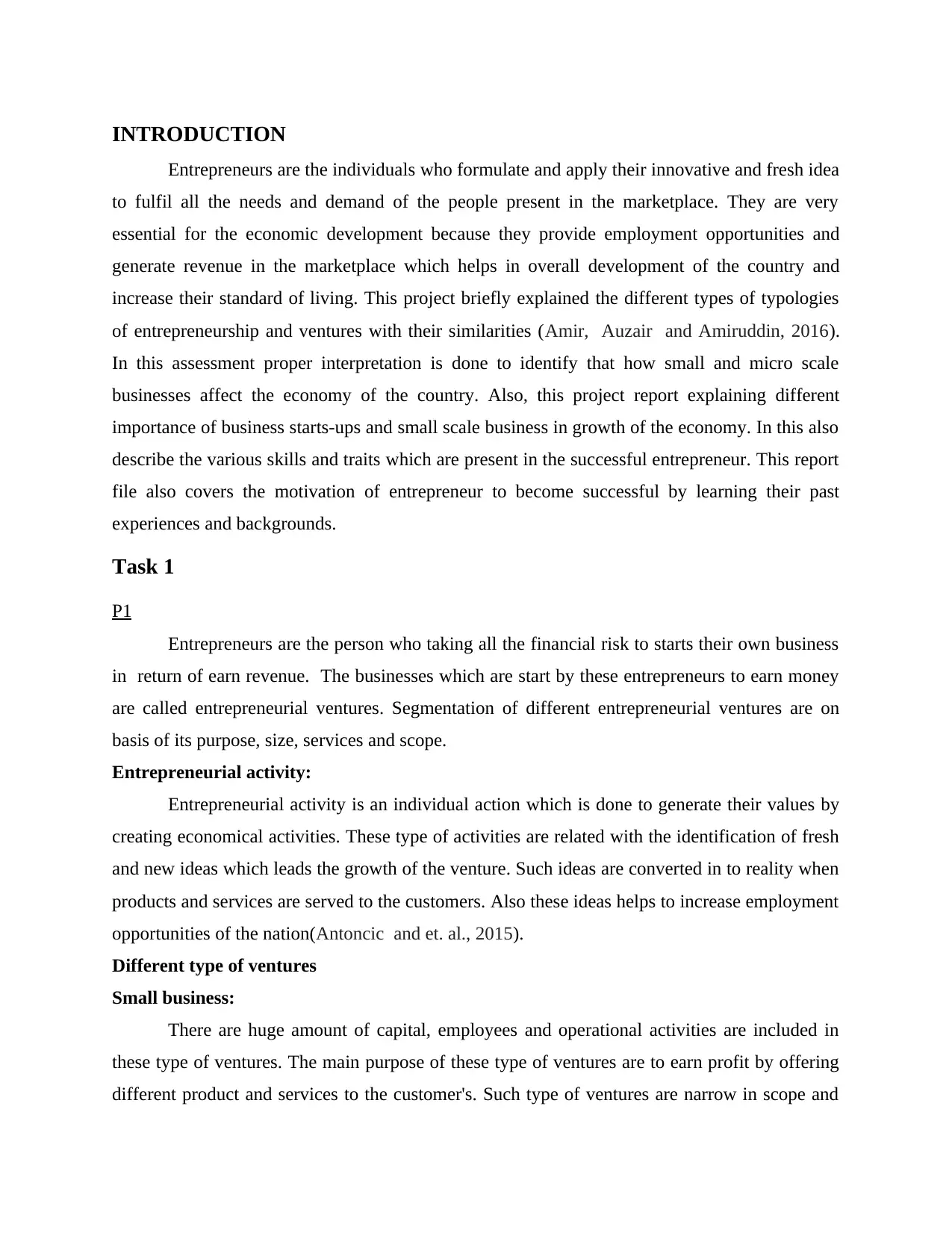
INTRODUCTION
Entrepreneurs are the individuals who formulate and apply their innovative and fresh idea
to fulfil all the needs and demand of the people present in the marketplace. They are very
essential for the economic development because they provide employment opportunities and
generate revenue in the marketplace which helps in overall development of the country and
increase their standard of living. This project briefly explained the different types of typologies
of entrepreneurship and ventures with their similarities (Amir, Auzair and Amiruddin, 2016).
In this assessment proper interpretation is done to identify that how small and micro scale
businesses affect the economy of the country. Also, this project report explaining different
importance of business starts-ups and small scale business in growth of the economy. In this also
describe the various skills and traits which are present in the successful entrepreneur. This report
file also covers the motivation of entrepreneur to become successful by learning their past
experiences and backgrounds.
Task 1
P1
Entrepreneurs are the person who taking all the financial risk to starts their own business
in return of earn revenue. The businesses which are start by these entrepreneurs to earn money
are called entrepreneurial ventures. Segmentation of different entrepreneurial ventures are on
basis of its purpose, size, services and scope.
Entrepreneurial activity:
Entrepreneurial activity is an individual action which is done to generate their values by
creating economical activities. These type of activities are related with the identification of fresh
and new ideas which leads the growth of the venture. Such ideas are converted in to reality when
products and services are served to the customers. Also these ideas helps to increase employment
opportunities of the nation(Antoncic and et. al., 2015).
Different type of ventures
Small business:
There are huge amount of capital, employees and operational activities are included in
these type of ventures. The main purpose of these type of ventures are to earn profit by offering
different product and services to the customer's. Such type of ventures are narrow in scope and
Entrepreneurs are the individuals who formulate and apply their innovative and fresh idea
to fulfil all the needs and demand of the people present in the marketplace. They are very
essential for the economic development because they provide employment opportunities and
generate revenue in the marketplace which helps in overall development of the country and
increase their standard of living. This project briefly explained the different types of typologies
of entrepreneurship and ventures with their similarities (Amir, Auzair and Amiruddin, 2016).
In this assessment proper interpretation is done to identify that how small and micro scale
businesses affect the economy of the country. Also, this project report explaining different
importance of business starts-ups and small scale business in growth of the economy. In this also
describe the various skills and traits which are present in the successful entrepreneur. This report
file also covers the motivation of entrepreneur to become successful by learning their past
experiences and backgrounds.
Task 1
P1
Entrepreneurs are the person who taking all the financial risk to starts their own business
in return of earn revenue. The businesses which are start by these entrepreneurs to earn money
are called entrepreneurial ventures. Segmentation of different entrepreneurial ventures are on
basis of its purpose, size, services and scope.
Entrepreneurial activity:
Entrepreneurial activity is an individual action which is done to generate their values by
creating economical activities. These type of activities are related with the identification of fresh
and new ideas which leads the growth of the venture. Such ideas are converted in to reality when
products and services are served to the customers. Also these ideas helps to increase employment
opportunities of the nation(Antoncic and et. al., 2015).
Different type of ventures
Small business:
There are huge amount of capital, employees and operational activities are included in
these type of ventures. The main purpose of these type of ventures are to earn profit by offering
different product and services to the customer's. Such type of ventures are narrow in scope and
⊘ This is a preview!⊘
Do you want full access?
Subscribe today to unlock all pages.

Trusted by 1+ million students worldwide
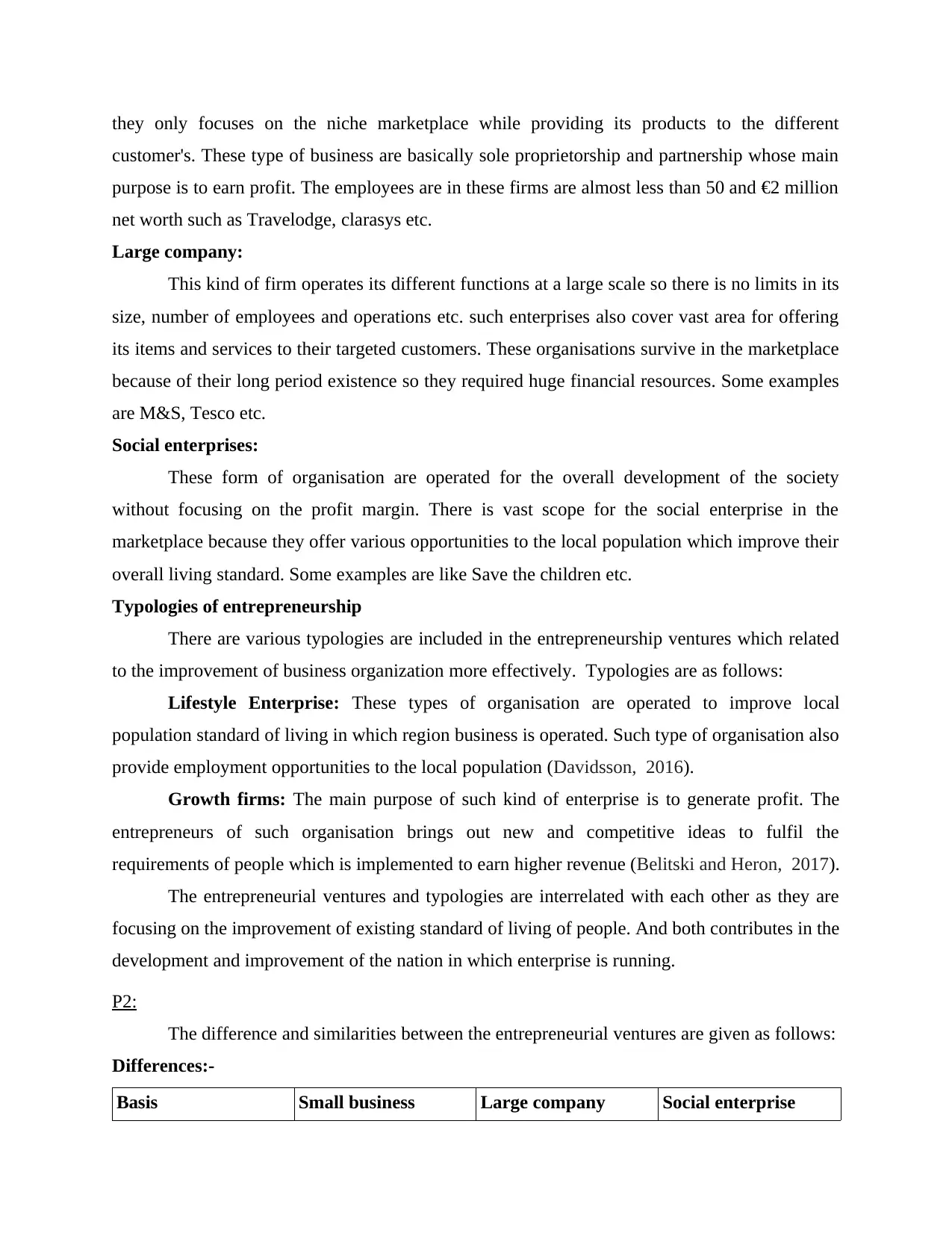
they only focuses on the niche marketplace while providing its products to the different
customer's. These type of business are basically sole proprietorship and partnership whose main
purpose is to earn profit. The employees are in these firms are almost less than 50 and €2 million
net worth such as Travelodge, clarasys etc.
Large company:
This kind of firm operates its different functions at a large scale so there is no limits in its
size, number of employees and operations etc. such enterprises also cover vast area for offering
its items and services to their targeted customers. These organisations survive in the marketplace
because of their long period existence so they required huge financial resources. Some examples
are M&S, Tesco etc.
Social enterprises:
These form of organisation are operated for the overall development of the society
without focusing on the profit margin. There is vast scope for the social enterprise in the
marketplace because they offer various opportunities to the local population which improve their
overall living standard. Some examples are like Save the children etc.
Typologies of entrepreneurship
There are various typologies are included in the entrepreneurship ventures which related
to the improvement of business organization more effectively. Typologies are as follows:
Lifestyle Enterprise: These types of organisation are operated to improve local
population standard of living in which region business is operated. Such type of organisation also
provide employment opportunities to the local population (Davidsson, 2016).
Growth firms: The main purpose of such kind of enterprise is to generate profit. The
entrepreneurs of such organisation brings out new and competitive ideas to fulfil the
requirements of people which is implemented to earn higher revenue (Belitski and Heron, 2017).
The entrepreneurial ventures and typologies are interrelated with each other as they are
focusing on the improvement of existing standard of living of people. And both contributes in the
development and improvement of the nation in which enterprise is running.
P2:
The difference and similarities between the entrepreneurial ventures are given as follows:
Differences:-
Basis Small business Large company Social enterprise
customer's. These type of business are basically sole proprietorship and partnership whose main
purpose is to earn profit. The employees are in these firms are almost less than 50 and €2 million
net worth such as Travelodge, clarasys etc.
Large company:
This kind of firm operates its different functions at a large scale so there is no limits in its
size, number of employees and operations etc. such enterprises also cover vast area for offering
its items and services to their targeted customers. These organisations survive in the marketplace
because of their long period existence so they required huge financial resources. Some examples
are M&S, Tesco etc.
Social enterprises:
These form of organisation are operated for the overall development of the society
without focusing on the profit margin. There is vast scope for the social enterprise in the
marketplace because they offer various opportunities to the local population which improve their
overall living standard. Some examples are like Save the children etc.
Typologies of entrepreneurship
There are various typologies are included in the entrepreneurship ventures which related
to the improvement of business organization more effectively. Typologies are as follows:
Lifestyle Enterprise: These types of organisation are operated to improve local
population standard of living in which region business is operated. Such type of organisation also
provide employment opportunities to the local population (Davidsson, 2016).
Growth firms: The main purpose of such kind of enterprise is to generate profit. The
entrepreneurs of such organisation brings out new and competitive ideas to fulfil the
requirements of people which is implemented to earn higher revenue (Belitski and Heron, 2017).
The entrepreneurial ventures and typologies are interrelated with each other as they are
focusing on the improvement of existing standard of living of people. And both contributes in the
development and improvement of the nation in which enterprise is running.
P2:
The difference and similarities between the entrepreneurial ventures are given as follows:
Differences:-
Basis Small business Large company Social enterprise
Paraphrase This Document
Need a fresh take? Get an instant paraphrase of this document with our AI Paraphraser
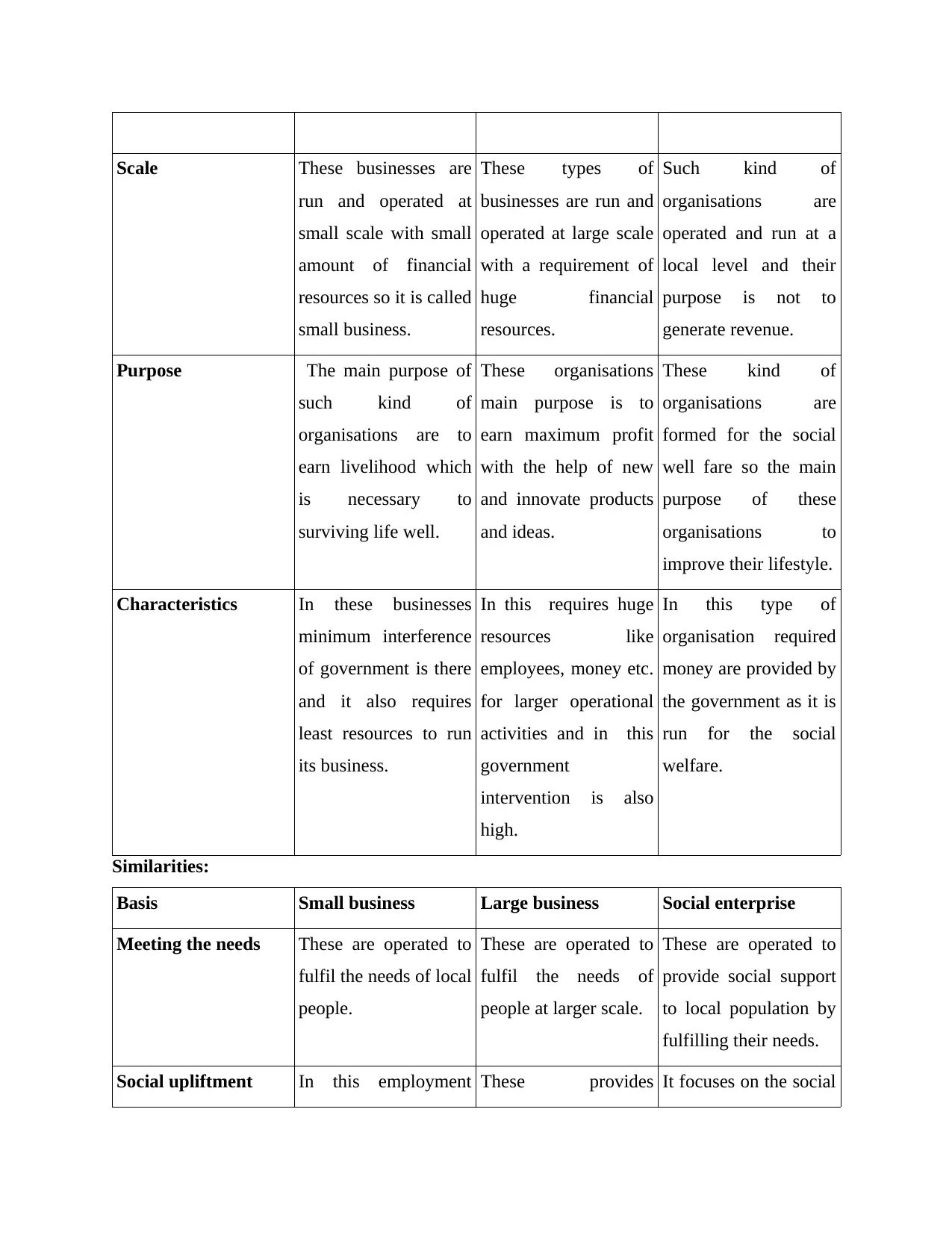
Scale These businesses are
run and operated at
small scale with small
amount of financial
resources so it is called
small business.
These types of
businesses are run and
operated at large scale
with a requirement of
huge financial
resources.
Such kind of
organisations are
operated and run at a
local level and their
purpose is not to
generate revenue.
Purpose The main purpose of
such kind of
organisations are to
earn livelihood which
is necessary to
surviving life well.
These organisations
main purpose is to
earn maximum profit
with the help of new
and innovate products
and ideas.
These kind of
organisations are
formed for the social
well fare so the main
purpose of these
organisations to
improve their lifestyle.
Characteristics In these businesses
minimum interference
of government is there
and it also requires
least resources to run
its business.
In this requires huge
resources like
employees, money etc.
for larger operational
activities and in this
government
intervention is also
high.
In this type of
organisation required
money are provided by
the government as it is
run for the social
welfare.
Similarities:
Basis Small business Large business Social enterprise
Meeting the needs These are operated to
fulfil the needs of local
people.
These are operated to
fulfil the needs of
people at larger scale.
These are operated to
provide social support
to local population by
fulfilling their needs.
Social upliftment In this employment These provides It focuses on the social
run and operated at
small scale with small
amount of financial
resources so it is called
small business.
These types of
businesses are run and
operated at large scale
with a requirement of
huge financial
resources.
Such kind of
organisations are
operated and run at a
local level and their
purpose is not to
generate revenue.
Purpose The main purpose of
such kind of
organisations are to
earn livelihood which
is necessary to
surviving life well.
These organisations
main purpose is to
earn maximum profit
with the help of new
and innovate products
and ideas.
These kind of
organisations are
formed for the social
well fare so the main
purpose of these
organisations to
improve their lifestyle.
Characteristics In these businesses
minimum interference
of government is there
and it also requires
least resources to run
its business.
In this requires huge
resources like
employees, money etc.
for larger operational
activities and in this
government
intervention is also
high.
In this type of
organisation required
money are provided by
the government as it is
run for the social
welfare.
Similarities:
Basis Small business Large business Social enterprise
Meeting the needs These are operated to
fulfil the needs of local
people.
These are operated to
fulfil the needs of
people at larger scale.
These are operated to
provide social support
to local population by
fulfilling their needs.
Social upliftment In this employment These provides It focuses on the social
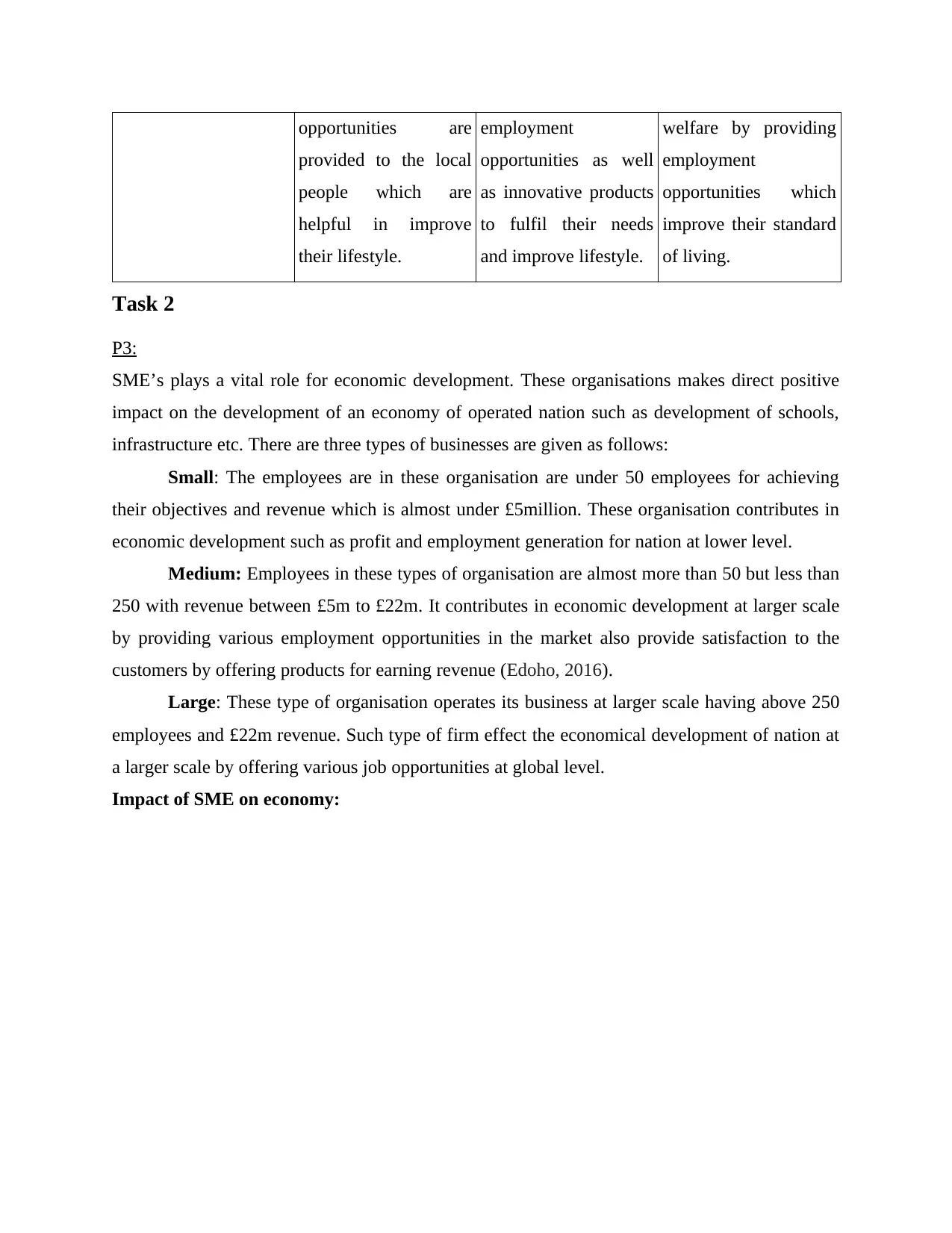
opportunities are
provided to the local
people which are
helpful in improve
their lifestyle.
employment
opportunities as well
as innovative products
to fulfil their needs
and improve lifestyle.
welfare by providing
employment
opportunities which
improve their standard
of living.
Task 2
P3:
SME’s plays a vital role for economic development. These organisations makes direct positive
impact on the development of an economy of operated nation such as development of schools,
infrastructure etc. There are three types of businesses are given as follows:
Small: The employees are in these organisation are under 50 employees for achieving
their objectives and revenue which is almost under £5million. These organisation contributes in
economic development such as profit and employment generation for nation at lower level.
Medium: Employees in these types of organisation are almost more than 50 but less than
250 with revenue between £5m to £22m. It contributes in economic development at larger scale
by providing various employment opportunities in the market also provide satisfaction to the
customers by offering products for earning revenue (Edoho, 2016).
Large: These type of organisation operates its business at larger scale having above 250
employees and £22m revenue. Such type of firm effect the economical development of nation at
a larger scale by offering various job opportunities at global level.
Impact of SME on economy:
provided to the local
people which are
helpful in improve
their lifestyle.
employment
opportunities as well
as innovative products
to fulfil their needs
and improve lifestyle.
welfare by providing
employment
opportunities which
improve their standard
of living.
Task 2
P3:
SME’s plays a vital role for economic development. These organisations makes direct positive
impact on the development of an economy of operated nation such as development of schools,
infrastructure etc. There are three types of businesses are given as follows:
Small: The employees are in these organisation are under 50 employees for achieving
their objectives and revenue which is almost under £5million. These organisation contributes in
economic development such as profit and employment generation for nation at lower level.
Medium: Employees in these types of organisation are almost more than 50 but less than
250 with revenue between £5m to £22m. It contributes in economic development at larger scale
by providing various employment opportunities in the market also provide satisfaction to the
customers by offering products for earning revenue (Edoho, 2016).
Large: These type of organisation operates its business at larger scale having above 250
employees and £22m revenue. Such type of firm effect the economical development of nation at
a larger scale by offering various job opportunities at global level.
Impact of SME on economy:
⊘ This is a preview!⊘
Do you want full access?
Subscribe today to unlock all pages.

Trusted by 1+ million students worldwide
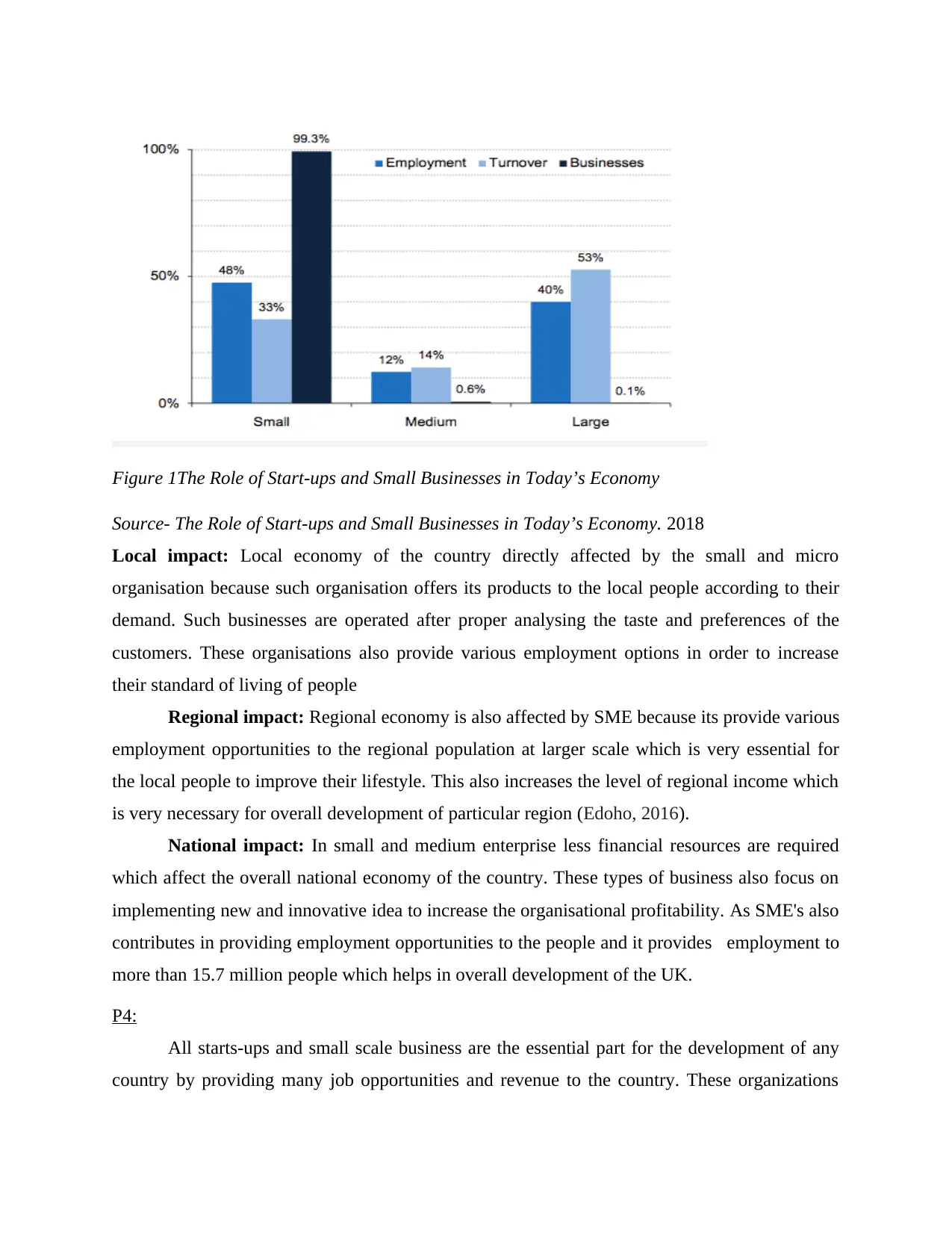
Figure 1The Role of Start-ups and Small Businesses in Today’s Economy
Source- The Role of Start-ups and Small Businesses in Today’s Economy. 2018
Local impact: Local economy of the country directly affected by the small and micro
organisation because such organisation offers its products to the local people according to their
demand. Such businesses are operated after proper analysing the taste and preferences of the
customers. These organisations also provide various employment options in order to increase
their standard of living of people
Regional impact: Regional economy is also affected by SME because its provide various
employment opportunities to the regional population at larger scale which is very essential for
the local people to improve their lifestyle. This also increases the level of regional income which
is very necessary for overall development of particular region (Edoho, 2016).
National impact: In small and medium enterprise less financial resources are required
which affect the overall national economy of the country. These types of business also focus on
implementing new and innovative idea to increase the organisational profitability. As SME's also
contributes in providing employment opportunities to the people and it provides employment to
more than 15.7 million people which helps in overall development of the UK.
P4:
All starts-ups and small scale business are the essential part for the development of any
country by providing many job opportunities and revenue to the country. These organizations
Source- The Role of Start-ups and Small Businesses in Today’s Economy. 2018
Local impact: Local economy of the country directly affected by the small and micro
organisation because such organisation offers its products to the local people according to their
demand. Such businesses are operated after proper analysing the taste and preferences of the
customers. These organisations also provide various employment options in order to increase
their standard of living of people
Regional impact: Regional economy is also affected by SME because its provide various
employment opportunities to the regional population at larger scale which is very essential for
the local people to improve their lifestyle. This also increases the level of regional income which
is very necessary for overall development of particular region (Edoho, 2016).
National impact: In small and medium enterprise less financial resources are required
which affect the overall national economy of the country. These types of business also focus on
implementing new and innovative idea to increase the organisational profitability. As SME's also
contributes in providing employment opportunities to the people and it provides employment to
more than 15.7 million people which helps in overall development of the UK.
P4:
All starts-ups and small scale business are the essential part for the development of any
country by providing many job opportunities and revenue to the country. These organizations
Paraphrase This Document
Need a fresh take? Get an instant paraphrase of this document with our AI Paraphraser
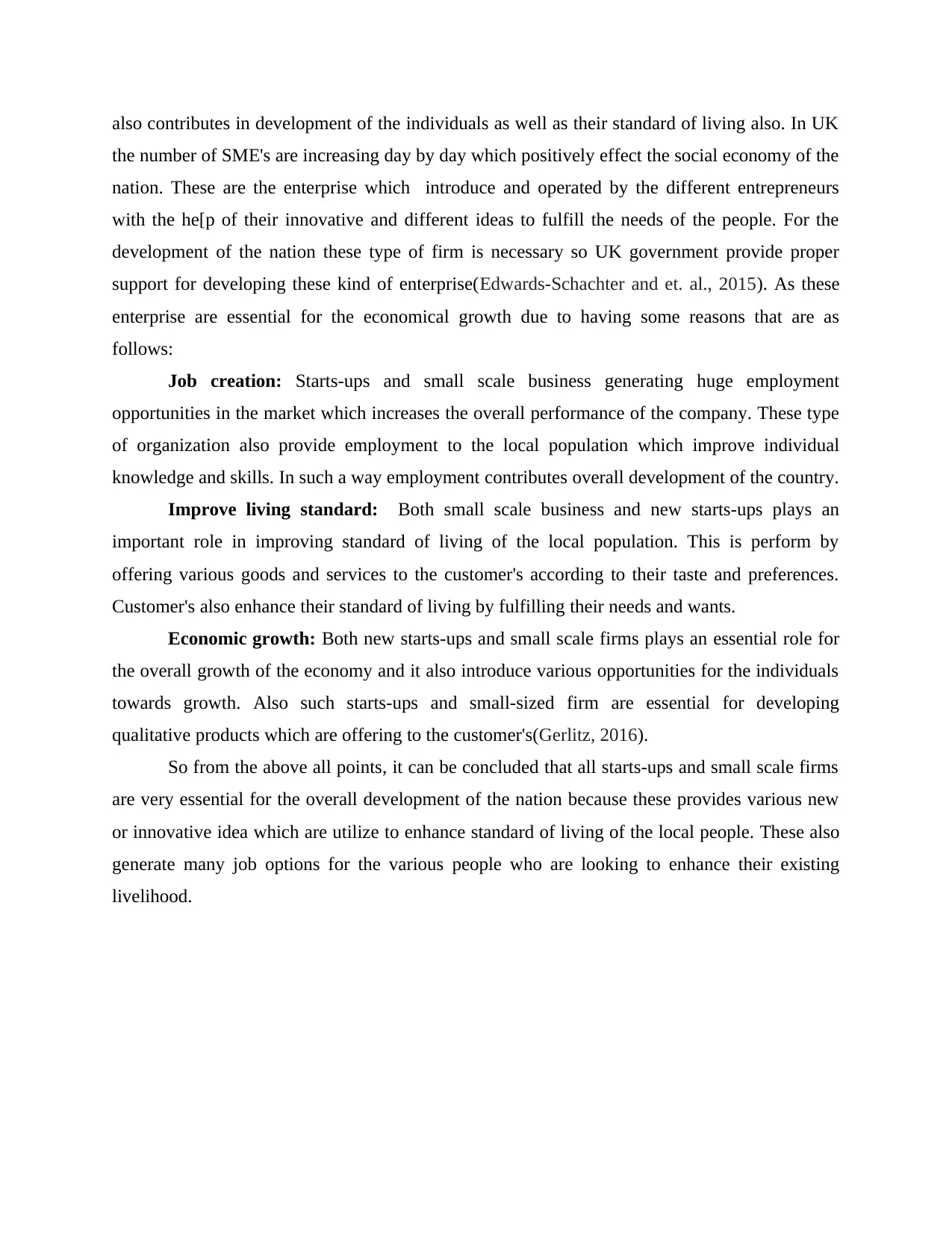
also contributes in development of the individuals as well as their standard of living also. In UK
the number of SME's are increasing day by day which positively effect the social economy of the
nation. These are the enterprise which introduce and operated by the different entrepreneurs
with the he[p of their innovative and different ideas to fulfill the needs of the people. For the
development of the nation these type of firm is necessary so UK government provide proper
support for developing these kind of enterprise(Edwards-Schachter and et. al., 2015). As these
enterprise are essential for the economical growth due to having some reasons that are as
follows:
Job creation: Starts-ups and small scale business generating huge employment
opportunities in the market which increases the overall performance of the company. These type
of organization also provide employment to the local population which improve individual
knowledge and skills. In such a way employment contributes overall development of the country.
Improve living standard: Both small scale business and new starts-ups plays an
important role in improving standard of living of the local population. This is perform by
offering various goods and services to the customer's according to their taste and preferences.
Customer's also enhance their standard of living by fulfilling their needs and wants.
Economic growth: Both new starts-ups and small scale firms plays an essential role for
the overall growth of the economy and it also introduce various opportunities for the individuals
towards growth. Also such starts-ups and small-sized firm are essential for developing
qualitative products which are offering to the customer's(Gerlitz, 2016).
So from the above all points, it can be concluded that all starts-ups and small scale firms
are very essential for the overall development of the nation because these provides various new
or innovative idea which are utilize to enhance standard of living of the local people. These also
generate many job options for the various people who are looking to enhance their existing
livelihood.
the number of SME's are increasing day by day which positively effect the social economy of the
nation. These are the enterprise which introduce and operated by the different entrepreneurs
with the he[p of their innovative and different ideas to fulfill the needs of the people. For the
development of the nation these type of firm is necessary so UK government provide proper
support for developing these kind of enterprise(Edwards-Schachter and et. al., 2015). As these
enterprise are essential for the economical growth due to having some reasons that are as
follows:
Job creation: Starts-ups and small scale business generating huge employment
opportunities in the market which increases the overall performance of the company. These type
of organization also provide employment to the local population which improve individual
knowledge and skills. In such a way employment contributes overall development of the country.
Improve living standard: Both small scale business and new starts-ups plays an
important role in improving standard of living of the local population. This is perform by
offering various goods and services to the customer's according to their taste and preferences.
Customer's also enhance their standard of living by fulfilling their needs and wants.
Economic growth: Both new starts-ups and small scale firms plays an essential role for
the overall growth of the economy and it also introduce various opportunities for the individuals
towards growth. Also such starts-ups and small-sized firm are essential for developing
qualitative products which are offering to the customer's(Gerlitz, 2016).
So from the above all points, it can be concluded that all starts-ups and small scale firms
are very essential for the overall development of the nation because these provides various new
or innovative idea which are utilize to enhance standard of living of the local people. These also
generate many job options for the various people who are looking to enhance their existing
livelihood.
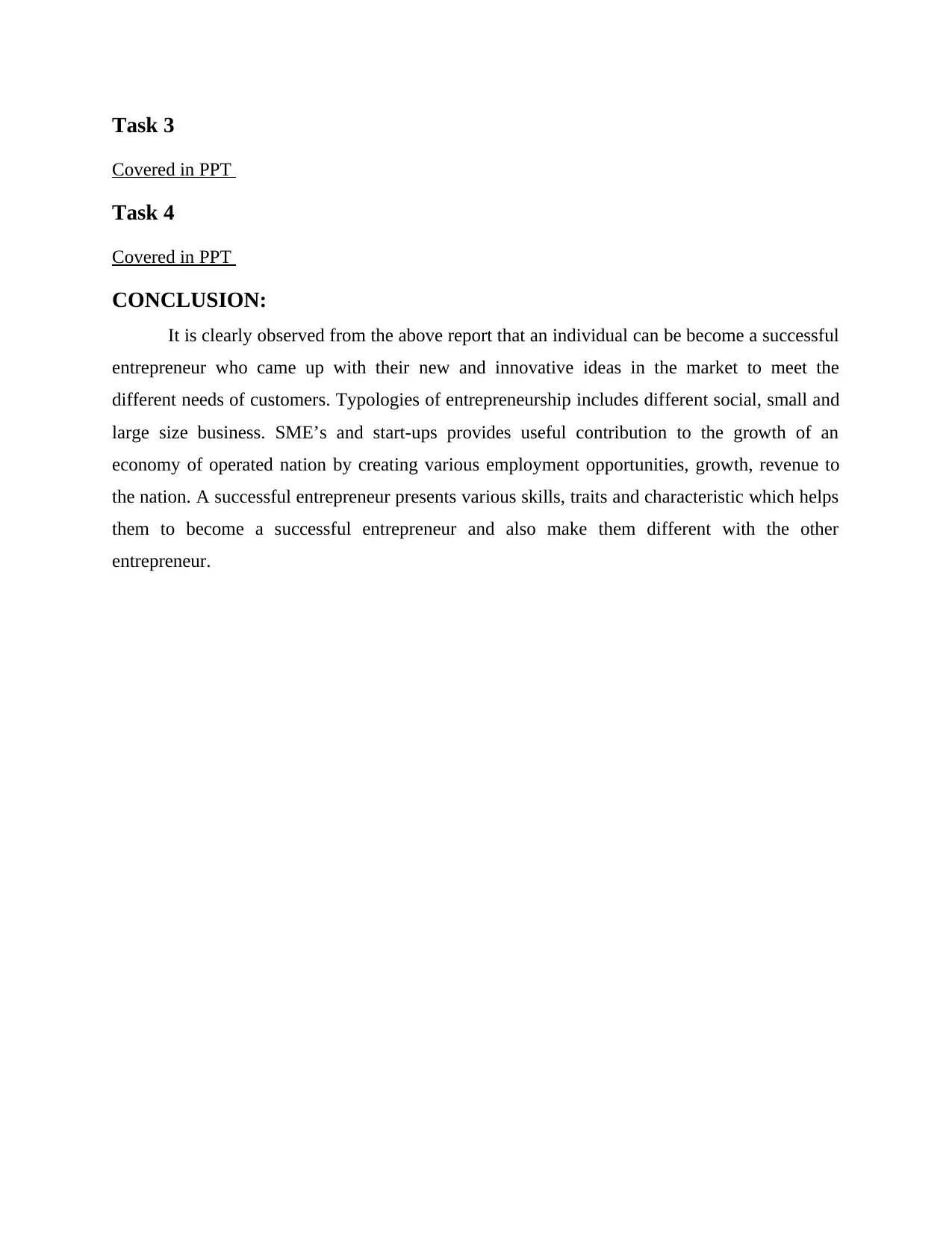
Task 3
Covered in PPT
Task 4
Covered in PPT
CONCLUSION:
It is clearly observed from the above report that an individual can be become a successful
entrepreneur who came up with their new and innovative ideas in the market to meet the
different needs of customers. Typologies of entrepreneurship includes different social, small and
large size business. SME’s and start-ups provides useful contribution to the growth of an
economy of operated nation by creating various employment opportunities, growth, revenue to
the nation. A successful entrepreneur presents various skills, traits and characteristic which helps
them to become a successful entrepreneur and also make them different with the other
entrepreneur.
Covered in PPT
Task 4
Covered in PPT
CONCLUSION:
It is clearly observed from the above report that an individual can be become a successful
entrepreneur who came up with their new and innovative ideas in the market to meet the
different needs of customers. Typologies of entrepreneurship includes different social, small and
large size business. SME’s and start-ups provides useful contribution to the growth of an
economy of operated nation by creating various employment opportunities, growth, revenue to
the nation. A successful entrepreneur presents various skills, traits and characteristic which helps
them to become a successful entrepreneur and also make them different with the other
entrepreneur.
⊘ This is a preview!⊘
Do you want full access?
Subscribe today to unlock all pages.

Trusted by 1+ million students worldwide
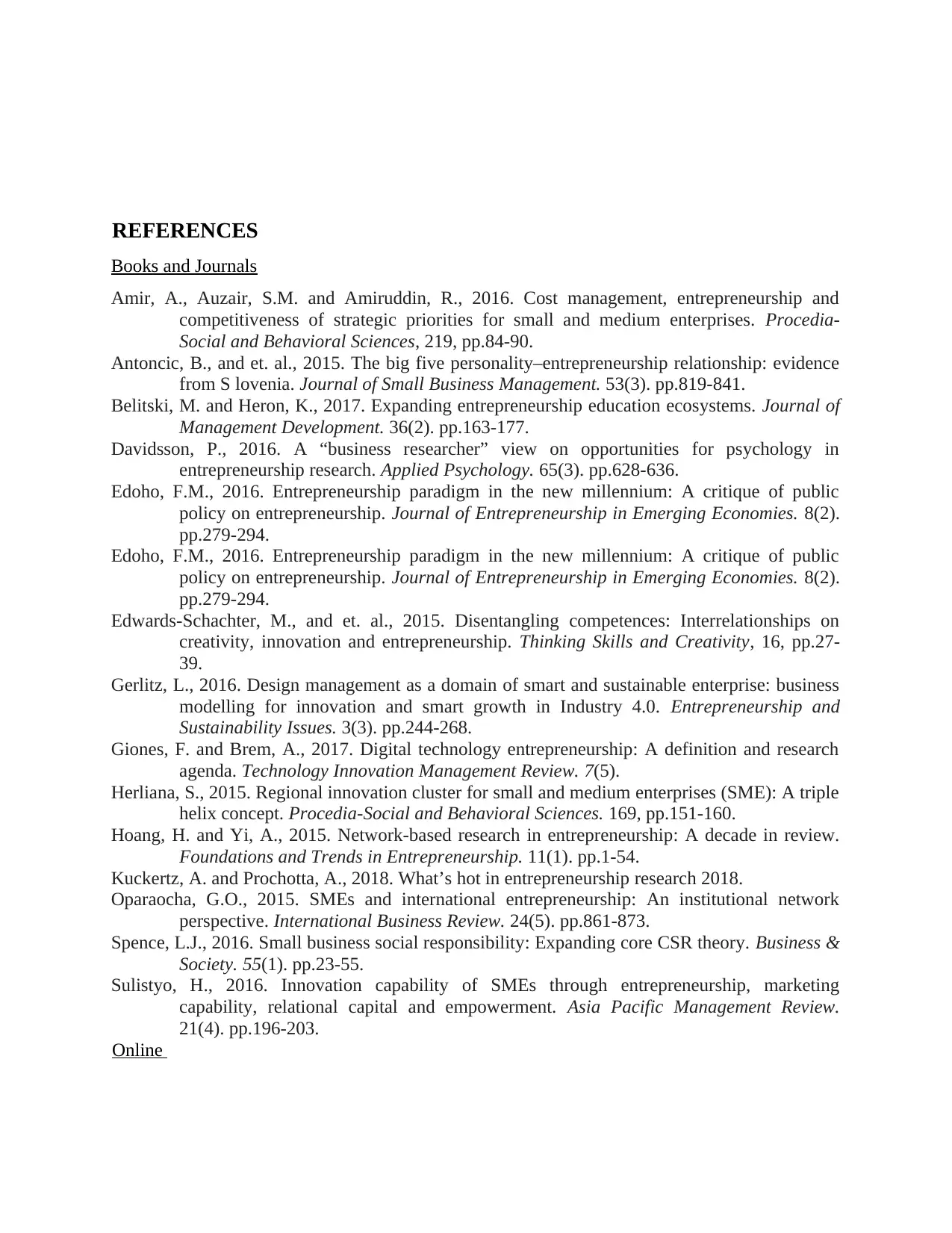
REFERENCES
Books and Journals
Amir, A., Auzair, S.M. and Amiruddin, R., 2016. Cost management, entrepreneurship and
competitiveness of strategic priorities for small and medium enterprises. Procedia-
Social and Behavioral Sciences, 219, pp.84-90.
Antoncic, B., and et. al., 2015. The big five personality–entrepreneurship relationship: evidence
from S lovenia. Journal of Small Business Management. 53(3). pp.819-841.
Belitski, M. and Heron, K., 2017. Expanding entrepreneurship education ecosystems. Journal of
Management Development. 36(2). pp.163-177.
Davidsson, P., 2016. A “business researcher” view on opportunities for psychology in
entrepreneurship research. Applied Psychology. 65(3). pp.628-636.
Edoho, F.M., 2016. Entrepreneurship paradigm in the new millennium: A critique of public
policy on entrepreneurship. Journal of Entrepreneurship in Emerging Economies. 8(2).
pp.279-294.
Edoho, F.M., 2016. Entrepreneurship paradigm in the new millennium: A critique of public
policy on entrepreneurship. Journal of Entrepreneurship in Emerging Economies. 8(2).
pp.279-294.
Edwards-Schachter, M., and et. al., 2015. Disentangling competences: Interrelationships on
creativity, innovation and entrepreneurship. Thinking Skills and Creativity, 16, pp.27-
39.
Gerlitz, L., 2016. Design management as a domain of smart and sustainable enterprise: business
modelling for innovation and smart growth in Industry 4.0. Entrepreneurship and
Sustainability Issues. 3(3). pp.244-268.
Giones, F. and Brem, A., 2017. Digital technology entrepreneurship: A definition and research
agenda. Technology Innovation Management Review. 7(5).
Herliana, S., 2015. Regional innovation cluster for small and medium enterprises (SME): A triple
helix concept. Procedia-Social and Behavioral Sciences. 169, pp.151-160.
Hoang, H. and Yi, A., 2015. Network-based research in entrepreneurship: A decade in review.
Foundations and Trends in Entrepreneurship. 11(1). pp.1-54.
Kuckertz, A. and Prochotta, A., 2018. What’s hot in entrepreneurship research 2018.
Oparaocha, G.O., 2015. SMEs and international entrepreneurship: An institutional network
perspective. International Business Review. 24(5). pp.861-873.
Spence, L.J., 2016. Small business social responsibility: Expanding core CSR theory. Business &
Society. 55(1). pp.23-55.
Sulistyo, H., 2016. Innovation capability of SMEs through entrepreneurship, marketing
capability, relational capital and empowerment. Asia Pacific Management Review.
21(4). pp.196-203.
Online
Books and Journals
Amir, A., Auzair, S.M. and Amiruddin, R., 2016. Cost management, entrepreneurship and
competitiveness of strategic priorities for small and medium enterprises. Procedia-
Social and Behavioral Sciences, 219, pp.84-90.
Antoncic, B., and et. al., 2015. The big five personality–entrepreneurship relationship: evidence
from S lovenia. Journal of Small Business Management. 53(3). pp.819-841.
Belitski, M. and Heron, K., 2017. Expanding entrepreneurship education ecosystems. Journal of
Management Development. 36(2). pp.163-177.
Davidsson, P., 2016. A “business researcher” view on opportunities for psychology in
entrepreneurship research. Applied Psychology. 65(3). pp.628-636.
Edoho, F.M., 2016. Entrepreneurship paradigm in the new millennium: A critique of public
policy on entrepreneurship. Journal of Entrepreneurship in Emerging Economies. 8(2).
pp.279-294.
Edoho, F.M., 2016. Entrepreneurship paradigm in the new millennium: A critique of public
policy on entrepreneurship. Journal of Entrepreneurship in Emerging Economies. 8(2).
pp.279-294.
Edwards-Schachter, M., and et. al., 2015. Disentangling competences: Interrelationships on
creativity, innovation and entrepreneurship. Thinking Skills and Creativity, 16, pp.27-
39.
Gerlitz, L., 2016. Design management as a domain of smart and sustainable enterprise: business
modelling for innovation and smart growth in Industry 4.0. Entrepreneurship and
Sustainability Issues. 3(3). pp.244-268.
Giones, F. and Brem, A., 2017. Digital technology entrepreneurship: A definition and research
agenda. Technology Innovation Management Review. 7(5).
Herliana, S., 2015. Regional innovation cluster for small and medium enterprises (SME): A triple
helix concept. Procedia-Social and Behavioral Sciences. 169, pp.151-160.
Hoang, H. and Yi, A., 2015. Network-based research in entrepreneurship: A decade in review.
Foundations and Trends in Entrepreneurship. 11(1). pp.1-54.
Kuckertz, A. and Prochotta, A., 2018. What’s hot in entrepreneurship research 2018.
Oparaocha, G.O., 2015. SMEs and international entrepreneurship: An institutional network
perspective. International Business Review. 24(5). pp.861-873.
Spence, L.J., 2016. Small business social responsibility: Expanding core CSR theory. Business &
Society. 55(1). pp.23-55.
Sulistyo, H., 2016. Innovation capability of SMEs through entrepreneurship, marketing
capability, relational capital and empowerment. Asia Pacific Management Review.
21(4). pp.196-203.
Online
Paraphrase This Document
Need a fresh take? Get an instant paraphrase of this document with our AI Paraphraser

The Role of Start-ups and Small Businesses in Today’s Economy. 2018. [Online]. Available
through:<https://www.market-inspector.co.uk/blog/2017/05/facts-about-small-medium-
businesses-in-the-uk>.
through:<https://www.market-inspector.co.uk/blog/2017/05/facts-about-small-medium-
businesses-in-the-uk>.
1 out of 11
Related Documents
Your All-in-One AI-Powered Toolkit for Academic Success.
+13062052269
info@desklib.com
Available 24*7 on WhatsApp / Email
![[object Object]](/_next/static/media/star-bottom.7253800d.svg)
Unlock your academic potential
Copyright © 2020–2026 A2Z Services. All Rights Reserved. Developed and managed by ZUCOL.



